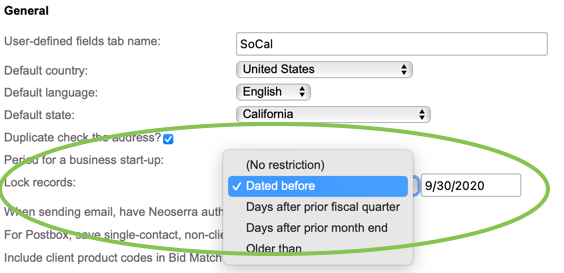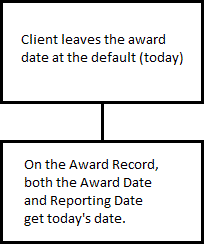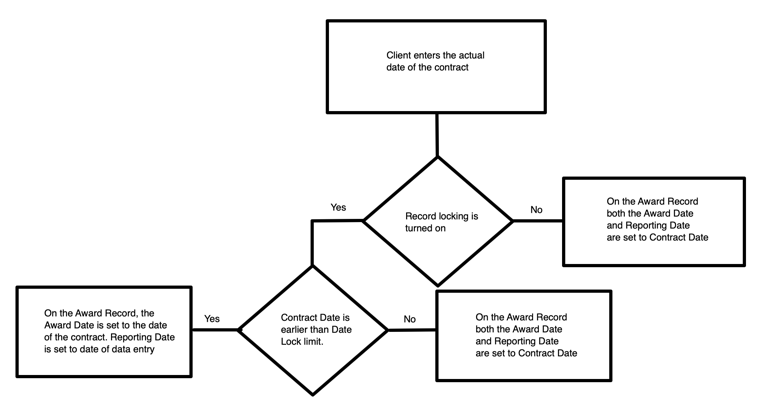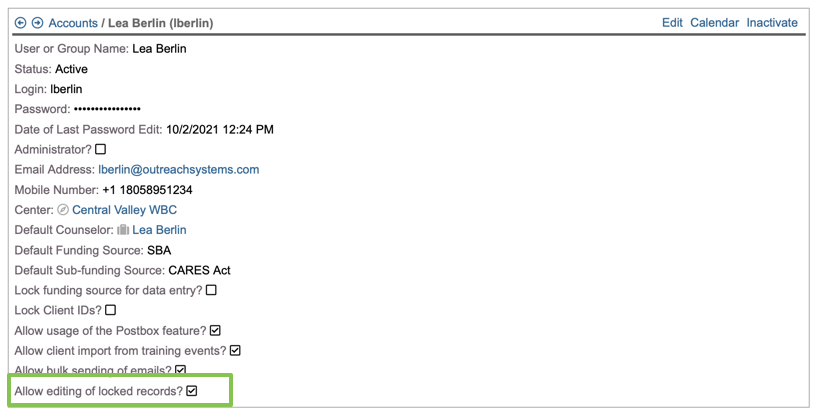How do I "lock" previously reported data to ensure database and reporting integrity?
Database administrators have access to a record locking tool which allows them to accomplish two things toward maintaining database and reporting integrity:
- It prevents non-administrative users from changing previously reported client activity or back-dating newly entered activity into a previous reporting period.
- It ensures that activity entered by clients on eCenter in response to a survey is dated so that it will not be entered under a previous reporting period.
Record locking is managed from the "General" panel under Administration|Configuration. The Lock Records field can be configured so that records are locked based on:
- A rolling number of days;
- A specific date;
- X days after the prior fiscal quarter*;
- X days after the prior month
* Your fiscal quarters are determined based upon the Fiscal year start month entered at the bottom of the General Settings page. Thus, if your fiscal year starts in October, and you choose to lock your data 10 days after the prior fiscal quarter, and today is January 5th, then you can still edit sessions dated between October - December. If today were January 15th, then you would only be able to edit data in the current fiscal quarter (January 1 - March 31).
Also, it should be noted that if you indicate 10 days after the end of the prior month, for example, then users can continue to edit up to midnight of the 10th day.

Note: Record locking only affects activity records. It does not lock the client record. As discussed at the bottom of this FAQ, there may be additional funding related locks that could prevent the user from editing the client record, but those are not controlled with this options.
Date locking is applied to all session records such as counseling sessions, milestone sessions, award sessions and capital funding sessions regardless of whether they are entered via Neoserra or via eCenter Direct. It also applies to training event and professional development sessions. In this FAQ we will discuss how the lock affects each session type:
- What does record locking mean for counseling sessions?
- What does record locking mean for milestone sessions?
- What does record locking mean for award sessions?
- What does record locking mean for capital funding sessions?
- What does record locking mean for training event records?
- What does record locking mean for professional development sessions?
- Who can edit locked sessions?
- Nexus Lock on counseling/capital funding session record
- Nexus Lock on training event record
- What does record locking mean for my clients with outstanding attribution requests?
- Other data locks
What does record locking mean for counseling sessions?
- Non-administrative Neoserra users cannot create a new counseling session with a Session Date prior to the lock date
- Non-administrative Neoserra users cannot edit an existing counseling session with a Session Date prior to the lock date
What does record locking mean for milestone sessions?
- Non-administrative Neoserra users cannot create a new milestone session with a Milestone Date prior to the lock date
- Non-administrative Neoserra users cannot edit an existing milestone session with a Milestone Date prior to the lock date
What does record locking mean for award sessions?
Besides the award record's Contract Date this record type also includes a Reporting Date field, which is the date used for reporting by scorecards. This means that your contract date can be within the locked period, but the reporting date cannot be within the locked period. If the record locking has been engaged then:
- Non-administrative Neoserra users cannot create a new award session with a Reporting Date prior to the lock date
- Non-administrative Neoserra users cannot edit an existing award session with a Reporting Date prior to the lock date
Record locking also affects records created on eCenter Direct. However, eCenter Direct will only offer your clients a single date to edit. Depending on what is entered here, Neoserra will use the record locking setting to determine what date to put in the Reporting Date field to help ensure that the activity is reported on.
The following examples use an award record to illustrate how date locking works in conjunction with eCenter Direct:
- The client leaves the award date at the default (today). In Neoserra, the resulting award record gets today's date for both the Reporting Date and the Award Date fields.
- The client enters the actual date of the contract. What happens to the award here depends on whether the date locking feature is turned on or not:
- Date locking is turned off: In Neoserra, the resulting award record gets the date the client entered for both the Reporting Date and the Award Date fields, no matter how old that date is.
- Date Locking is turned on:
- If the client enters a contract date older than the limit set by the date lock, the resulting Neoserra award record has the Award Date field set to what the client entered, and the Reporting Date field to the first day allowed by the lock.
- If the client enters a contract date more recent than the limit set by the Date Lock, the resulting Neoserra award record has both the Award Date field and the Reporting Date field set to the date entered by the client.


What does record locking mean for capital funding sessions?
Besides the capital funding record's Date Completed field, this record type also includes a Reporting Date field, which is the date used for reporting by scorecards. In this case, the Reporting Date field is used to determine which records should be locked.
- Non-administrative Neoserra users cannot create a new capital funding session with a Reporting Date prior to the lock date
- Non-administrative Neoserra users cannot edit an existing capital funding session with a Reporting Date prior to the lock date
What does record locking mean for training event records?
- Non-administrative Neoserra users cannot create a new training event record with a Reporting Date prior to the lock date
- Non-administrative Neoserra users cannot edit an existing training event record with a Reporting Date prior to the lock date
It should be noted, that while the lock prevents edits to the training event record itself, it does NOT prevent changes from being made to the attendee list. In other words, while the event record cannot be edited if the reporting date is prior to the lock date, you can change the status of attendees and add/delete attendees to the attendee list.
What does record locking mean for professional development sessions?
- Non-administrative Neoserra users cannot create a new professional development session with a Date prior to the lock date
- Non-administrative Neoserra users cannot edit an existing professional development session with a Date prior to the lock date
Who can edit locked sessions?
Administrators, in administrator-mode can always overwrite locked records. Furtermore, users that have the "Allow editing of locked records?" checkbox checked on their user account record, can edit locked records:

Users with overwrite permissions will know that they are editing a record that is technically locked because the following banner will appear at the top of the record:

Note: These users still cannot edit Nexus-locked records.
Nexus Lock on counseling/capital funding session record
Similarly, if a counseling or capital funding session has been exported to Nexus and has been accepted by Nexus then a non-administrative user will not be able to edit the following fields:
- Client
- Counselor(s)
- Contact time, prep time and/or travel time for counseling sessions
- Type:
- Session Type (i.e. Initial/Follow-up/etc.)
- Funding Type (i.e. Bank Loan/Microloan/etc.)
- Funding Area
- Center record
- Whether the session is reportable, or not
As always, Administrators will be able to edit these fields, the lock only applies to non-administrator users.
Nexus Lock on training event record
An event that has been uploaded and accepted by Nexus can be partially edited by a non-administrative user with the exception of the following fields:
- Reporting Date
- Funding Area
- Center record
- Whether the session is reportable, or not
These fields can only be edited by an administrator.
What does record locking mean for my clients with outstanding attribution requests?
When a client experiences positive growth, then you can ask them to "affirm" this growth and also ask him to "attribute" the growth to the efforts of your program as discussed in this FAQ.
However, what happens if you ask a client to affirm and attribute a milestone or capital funding session to your program and the client doesn't respond until after the record has been locked? Fortunately, the client can still affirm and attribute the impact to your program! In other words, while the milestone/capital funding record is locked from all other editing, the client can still add their signature to the record.
Why? Because the addition of the client's signature does not affect your SBA reporting. However, it should be noted, that since the Neoserra user cannot edit the specifics of the milestone/capital funding record, only updates via eCenter Direct can be made. If the client provides a hardcopy confirmation of attribution, then the counselor will need to seek the assistance of the lead center to edit the record.
Other data locks
Furthermore, general users should also be aware that they cannot enter in training events with dates further back than three months. This is not so much as a "lock" as it is a way to prevent the users from accidentally entering bad data into the database as discussed in this FAQ. If you do wish to enter an event with a date further back then three months, then you will first need to create the event using today's date; save the record; and then edit the record and correct the date.
Similarly, Neoserra will not allow you to enter any counseling session, milestone, capital funding session or awards session with a date that is more than a year in the past or three months in the future. Again, this is designed to avoid accidentally entering in bad data, particularly at the turn of a calendar year when users aren't accustomed to entering in the new year yet.
Want more? Browse our extensive list of Neoserra FAQs.
